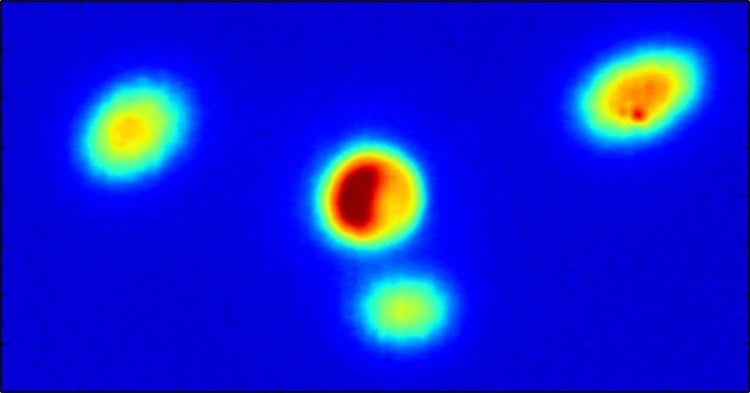Twin Orbit operation successfully tested at BESSY II

A synchrotron source point image of a bending magnet of the Twin Orbit modus. The second orbit closes after three revolution and is winding around the standard orbit at the center. Credit: HZB
The Twin Orbit operation mode makes use of non-linear beam dynamics and provides two stable well separated orbits for storing two electron beams in one storage ring. The bunch fill patterns of both orbits can be chosen, to some extent, independently, which allows for fulfilling normally incompatible user needs, simultaneously.
For example, one orbit can be used to store a homogenous multi bunch fill to deliver high average brilliance for photon hungry experiments, whereas only one single bunch is stored on the other orbit for timing experiments, providing a much lower pulse repetition rate.
First experiments in 2015
It is a long process from an idea to a real operational week, especially at a running multi user facility. First studies of this mode started already 2015 at the smaller ring, the Metrology Light Source (MLS), resulting in a successful user experiment with the Physikalisch Technische Bundesanstalt (PTB) [1]. In parallel a group of HZB experts implemented and optimized this mode at BESSY II in single machine commissioning shifts.
Important milestones have been the operation of a large number of insertion devices as well as the topping up injection scheme to keep the stored current constant. In 2017 a successful overnight run with topping up injection and some participating beamlines gave confidence for a first longer test week [2].
Excellent availabilty of synchrotron light
The days of this “Twin Orbit User Test week” have been used for common experiments of machine group and beamline scientists in order to characterize this operational mode and generate feedback for further optimization. During the nights and the complete weekend ‘normal’ user time was scheduled with two different fill patterns (multibunch and single bunch) on both orbits. The availability and stability of the synchrotron source were comparable to the current standard user mode and exceeds/reaches 99 per cent.
Elegant option for BESSY VSR
“There is still a lot of work to do, but nevertheless this proof-of-principle week showed that a development towards a realistic user mode should be possible. And even more, for the future BESSY VSR project, it could be a very elegant way to separate short and long bunches”, Prof. Andreas Jankowiak concludes.
[1] http://accelconf.web.cern.ch/AccelConf/IPAC2015/papers/mopwa021.pdf
[2] http://accelconf.web.cern.ch/AccelConf/ipac2017/papers/wepik057.pdf
More Information on Twin Orbit Modus:
Dr. Paul Goslawski
Media Contact
All latest news from the category: Physics and Astronomy
This area deals with the fundamental laws and building blocks of nature and how they interact, the properties and the behavior of matter, and research into space and time and their structures.
innovations-report provides in-depth reports and articles on subjects such as astrophysics, laser technologies, nuclear, quantum, particle and solid-state physics, nanotechnologies, planetary research and findings (Mars, Venus) and developments related to the Hubble Telescope.
Newest articles

Bringing bio-inspired robots to life
Nebraska researcher Eric Markvicka gets NSF CAREER Award to pursue manufacture of novel materials for soft robotics and stretchable electronics. Engineers are increasingly eager to develop robots that mimic the…

Bella moths use poison to attract mates
Scientists are closer to finding out how. Pyrrolizidine alkaloids are as bitter and toxic as they are hard to pronounce. They’re produced by several different types of plants and are…

AI tool creates ‘synthetic’ images of cells
…for enhanced microscopy analysis. Observing individual cells through microscopes can reveal a range of important cell biological phenomena that frequently play a role in human diseases, but the process of…





















